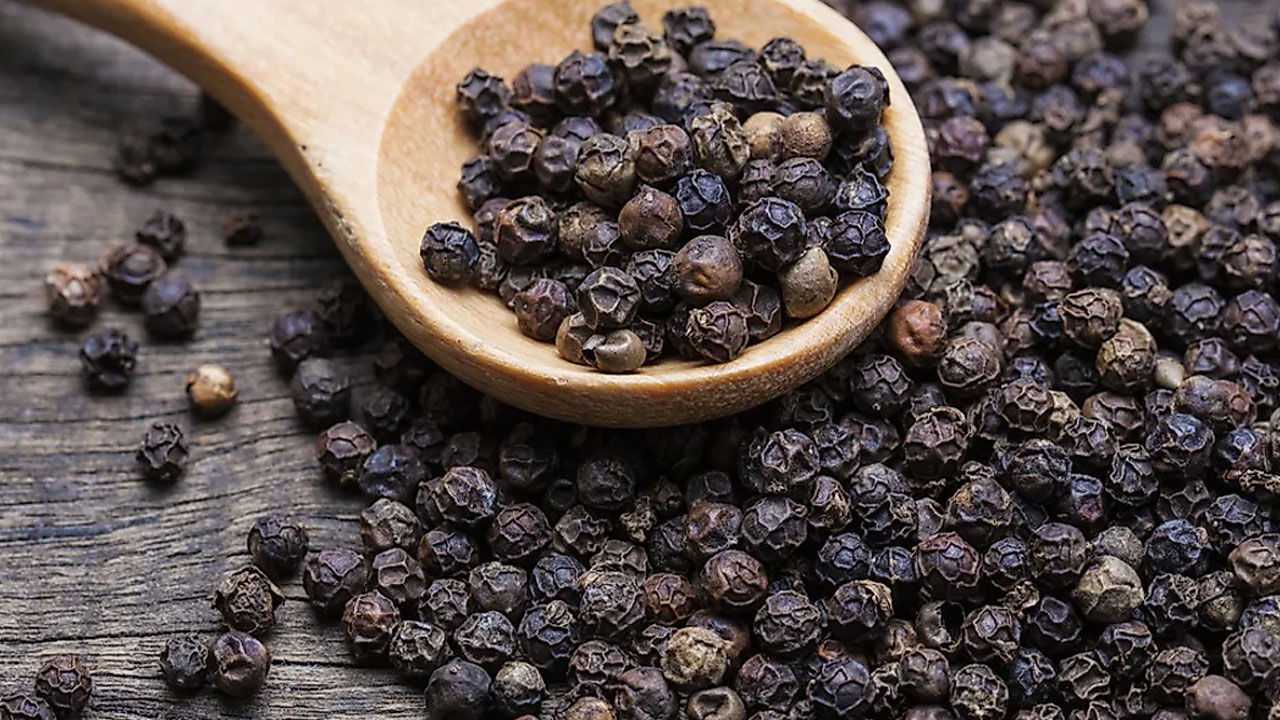- Kisan
- August 2, 2021
- 4:02 pm
Health Benefits of King of Spices (Black Pepper)

Black pepper is the fruit of the black pepper plant from the Piperaceae family and is used as both, a spice and a medicine. The chemical piperine, which is present in black pepper, causes the spiciness. It is native to Kerala, the southern state of India. Since ancient times, it has been one of the widely-traded spices in the world. When dried, this plant-derived spice is referred to as a peppercorn. Because of its antibacterial properties, pepper is used to preserve food. Common pepper is also a very good anti-inflammatory agent. Also called ‘Kaali Mirch’ in Hindi and called the ‘King of Spices’ and ‘Black Gold’, black pepper has a unique taste of its own, and it is not intended to be used like salt.
Nutrition Facts of Black Pepper
It is a rich source of minerals like manganese, copper, magnesium, calcium, phosphorous, iron, potassium and vitamins like riboflavin, vitamin C, K, and B6. It has a high content of dietary fiber and has a moderate amount of protein and carbohydrates too.
Common pepper should be consumed in moderate quantities and not in excess as it is a spice and not a food type. When used with other ingredients like turmeric, fenugreek, cinnamon, and cumin, it formulates a great combination of spices. In one tablespoon (6 grams) of black pepper, there are 15.9 calories, 4.1 grams of carbohydrates, and 0 grams of fat and cholesterol. Sodium content is about 3 mg, carbohydrates are 4 grams, and dietary fiber is 2 grams. Pepper has vitamin C content of about 2% of the dietary value, the calcium content of 3% of what can be consumed in your diet, and iron that has a 10% dietary value share. Proteins are a decent 0.7 grams.
Pepper vine comes from the berries of the pepper plant. Black pepper, green pepper, and white peppercorns are actually the same fruit (Piper nigrum); the difference in their color is a reflection of varying stages of development and processing methods. Black peppercorns are made by picking the pepper berries when they are half ripe and just about to turn red. They are then left to dry, which causes them to shrivel and become dark in color. It is the most pungent and flavorful of all types of peppers and it is available as whole or cracked peppercorns or ground into powder.
How is Black Pepper Beneficial For Health?
The piperine in black pepper has numerous beneficial properties (antioxidant, antibacterial, etc.) that can improve your health in many ways. Some of the good effects of black pepper include cancer and diabetes prevention, improved digestive health, and enhanced brain health.
Improve Digestive Health: pepper vine stimulates the digestive juices and enzymes, thereby promoting digestion. This holds true when you consume black pepper, especially with a meal, which might enhance your body’s ability break down and digest food.
Prevent Cancer: Studies have shown that the piperine in black pepper exerts protective activity against numerous forms of cancer. Piperine also increases the absorption of other nutrients like selenium, curcumin, beta-carotene, and B vitamins in your intestines – nutrients that are vital for gut health and cancer prevention.
Antibacterial Quality: The antibacterial property of piper nigrum helps to fight against infections and insect bites. Pepper added to the diet helps to keep your arteries clean by acting in a similar way to fiber and scraping excess cholesterol from the walls, thereby helping to reduce atherosclerosis, the condition highly responsible for heart attack and stroke.
Thus, like black pepper, the other Indian spices are also enriched by diversity of health benefits. To stay tuned, keep reading these blogs.